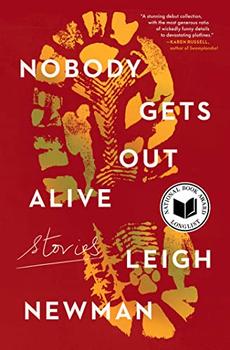Summary | Excerpt | Reading Guide | Reviews | Beyond the Book | Readalikes | Genres & Themes | Author Bio

Stories
by Leigh Newman
"Most of it, she threw up," he said. "By the looks of the grass."
"I have an open house, Carl."
The flies were moving in—a throbbing blanket of vicious, busy bottle-green. With the sun out, the smell would be next.
"I could always run to Costco. Pick us up some steaks." His tone was kind, even understanding, but steaks were not what I wanted. And there was no way to explain what I wanted, which was everything the way it was years before. Neighbors in the backyard. Charcoal smoke. Bug dope. A watermelon. People showing up with a casserole, leaving with their laughter and wet hair after a dip in the hot tub. Whatever my private upheavals, there was always that at least.
A duck paddled past my dock, blown over by the current that was ruffling the surface. I missed wind socks. Everybody on Diamond Lake used to have a rainbow wind sock tied to their deck. It added a cheerful note to the shoreline.
"I had her by the woodpile," said Carl. "But she gave me the slip."
"I think you should go," I said. "Just go get your flight."
He shrugged, scratched a bit of dry skin on his neck. "I can get another."
"Right," I said. "The fishing trip to Houston."
He looked at me, as if ashamed, and I felt a little bad about calling out his lie. As far as he, I, and everybody we knew understood Houston, it wasn't even a city, just a mythical, cutting-edge treatment center, the Shangri-La of last-hope clinical trials. You went there to get a few more months to not die.
"Well," he said. "You got me, Dutch." He laughed. I didn't. Another leaf blazed down toward us. Fall lasts for weeks now—which, despite my best efforts, still befuddles me. All my life, fall took about three days in August, the leaves dropping almost overnight, followed by a licorice snow taste in the wind. Global warming, the papers say, though almost all the articles talk about are the dying caribou and the starving puffins, never the less obvious, alarming changes of every day and the guilt about living in an oil state that goes along with it. As if the rest of the country, sucking up all that oil, wasn't also to blame.
Donald ran by us, headed for the water with a moose rib in his fist. Candace followed with my snow shovel and a garbage bag. She was still in her nightgown. Watching her try to scoop raw-meat dog vomit off the grass while wearing a gauzy orgasm of white chiffon was one of the more moving experiences of my life. She really did want to help.
I sat down on the steps. Carl sat next to me, close, then an inch closer.
"Dutch," he said. "What a fucking corner we have found ourselves in."
I smiled. It felt like a small, broken snowflake in the middle of my face. There was a list of questions I was supposed to ask: what kind, what stage, what organ, herbal teas, protein smoothies? Instead an image floated through my mind. His trailer. His kitchen. The byzantine mobile-home cabinetry he built himself.
For each of the six days that we lived together, I lay there in bed every morning, watching Carl make coffee, memorizing where he had stuck the cups, the creamer, the filters, so that I could make the coffee for us one day—an idea that made me so happy I had to shut my eyes and pretend to be asleep.
It was September then too. Mushrooms bloomed in the corners of the walls. Carl scraped them down with a pocketknife he wiped clean with a chamois cloth. We made spaghetti and played gin rummy and dragged ourselves out of bed only for glasses of cold well water. I was careful where I left my clothes, though, careful not to leave them on the floor, where they would take up room. I had left Wallace. And the dog. And even Howl Palace.
On the morning of the seventh day, Carl sat me down and said, in the stiff, unsettled way he had adopted the minute I arrived, "It's just that I didn't know it'd be so close."
"Me neither," I said, still thinking he was talking about square footage.
Excerpted from Nobody Gets Out Alive by Leigh Newman. Copyright © 2022 by Leigh Newman. Excerpted by permission of Scribner. All rights reserved. No part of this excerpt may be reproduced or reprinted without permission in writing from the publisher.
Courage - a perfect sensibility of the measure of danger, and a mental willingness to endure it.
Click Here to find out who said this, as well as discovering other famous literary quotes!
Your guide toexceptional books
BookBrowse seeks out and recommends the best in contemporary fiction and nonfiction—books that not only engage and entertain but also deepen our understanding of ourselves and the world around us.